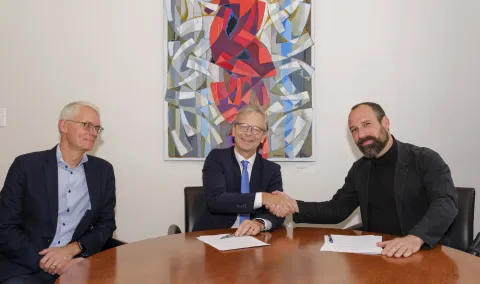
Jón Atli Benediktsson, Rector of the University of Iceland, and Daniel Leeb, Executive Mission Director of the Iceland Space Agency (ISA), which is a private organisation, have signed a Memorandum of Understanding (MOU) committing to collaboration in space research. The University and ISA will pursue collaboration with scientists at international institutes such as NASA (National Aeronautics and Space Administration) and ESA (European Space Agency).
The feasibility of establishing a special space research institute in Iceland will be explored. One of the aims of signing this MOU is to create opportunities in space science for graduate students and postdoctoral researchers at the University of Iceland, potentially establishing student and staff exchange programmes with international partners. The MOU also states that the University and ISA will work together to create opportunities in STEAM subjects for students at all levels of the education system through ISA's contacts with NASA and projects related to planetary science.
The University of Iceland boasts incredible expertise in fields such as remote sensing, earth sciences, natural sciences, and artificial intelligence, all of which could be applied to space research in various ways. Furthermore, ISA has been making incredible strides over the last five years, developing specialist knowledge and a strong network in the field of space science.
The Icelandic landscape has a long history of being used as an environment for training astronauts and testing various space vehicles and equipment. This has put Iceland on the map as an attractive location for space research, meaning we have the potential to establish the country as a valuable partner in the international space sector.
In June the Iceland Space Agency will be working with Dr. Elizabeth Rampe, Dr. Fiona Thiessen, and Dr. Michael Thorpe from the joint NASA / ESA Mars Sample Return (MSR) Science team to collect Icelandic “regolith” that will be used to help validate the rigorous process that martian samples will be run through once they arrive to Earth in the next decade. A portion of the Icelandic samples will be kept at the University of Iceland for later analysis, and the ISA will be organising engagement events for interested students and faculty at the University once our mission has been completed. Mars Sample Return is perhaps the most ambitious science mission that NASA and the ESA have embarked on together, the science returned will not only shape our understanding of Mars, but could help us understand the potential for life beyond Earth. Iceland is honoured to be playing a small role in this monumental mission, this type of collaboration and engagement exemplifies the purpose of our MOU and is only the beginning,
“Space research and exploration has always and will continue to be a key innovation driver. This MOU will help to secure and promote Iceland’s position as a global leader for the sustainable development of technologies and research that may be destined for the moon and Mars, but will ultimately be of greatest impact right here on Earth,” said Daniel Leeb.